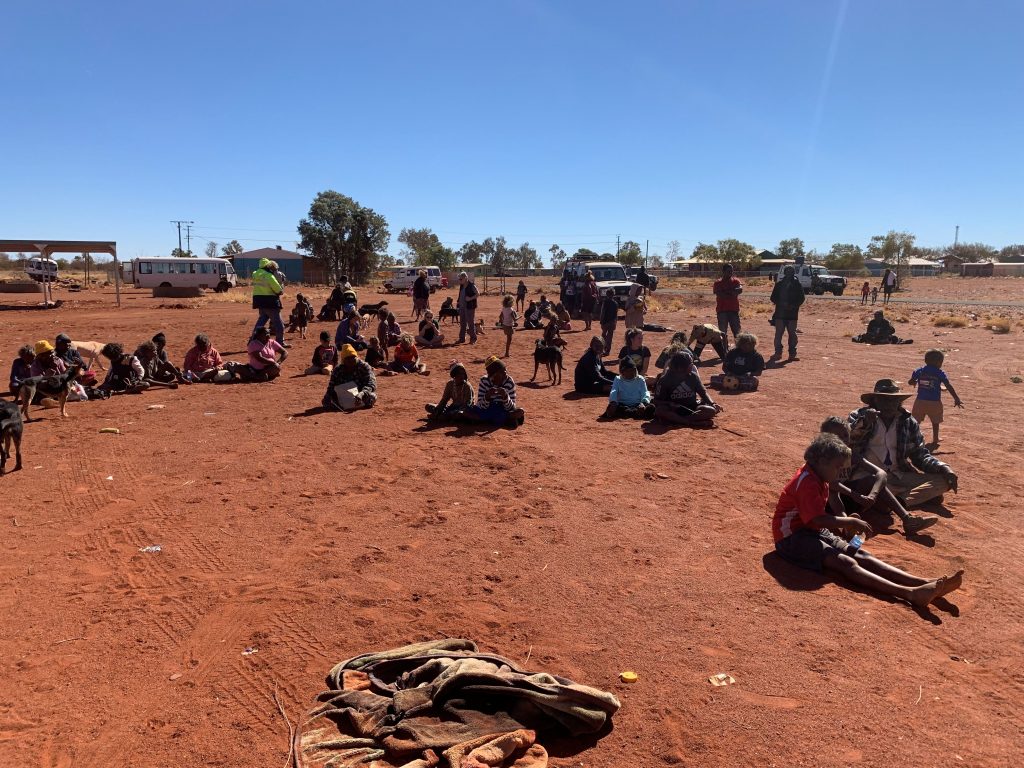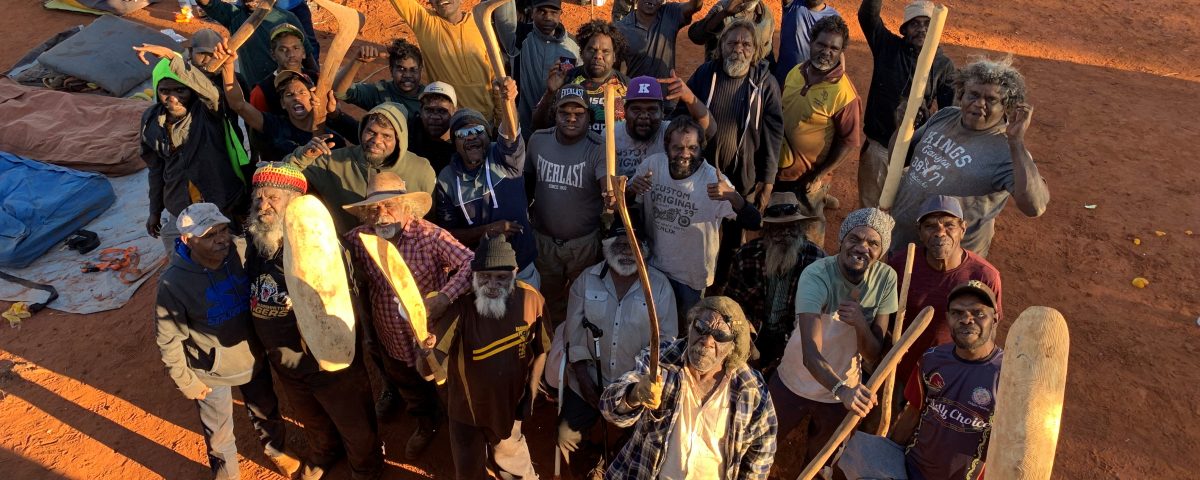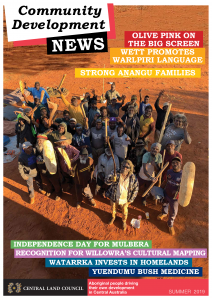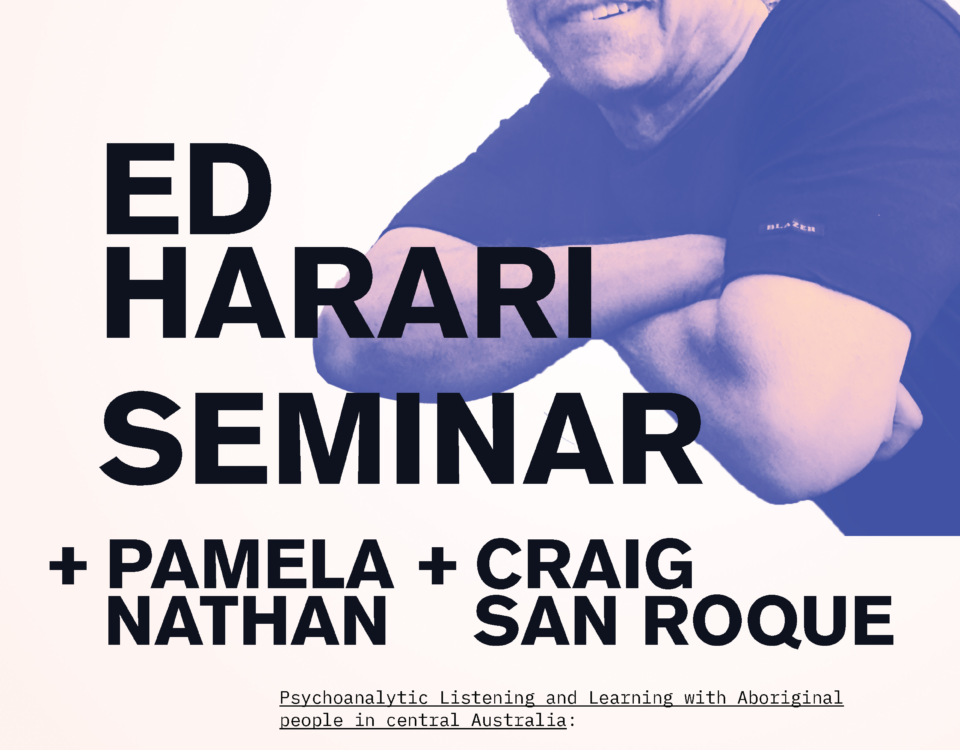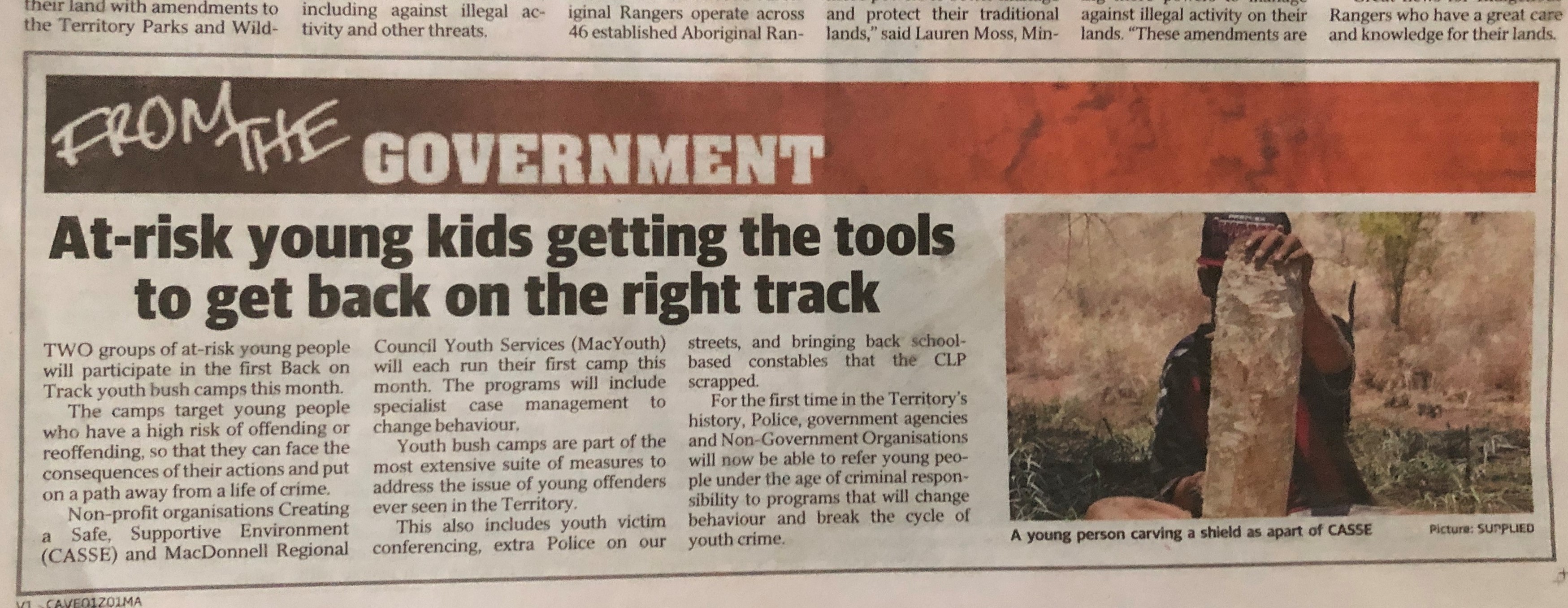
Back on track – first cultural bush camps begin
November 1, 2019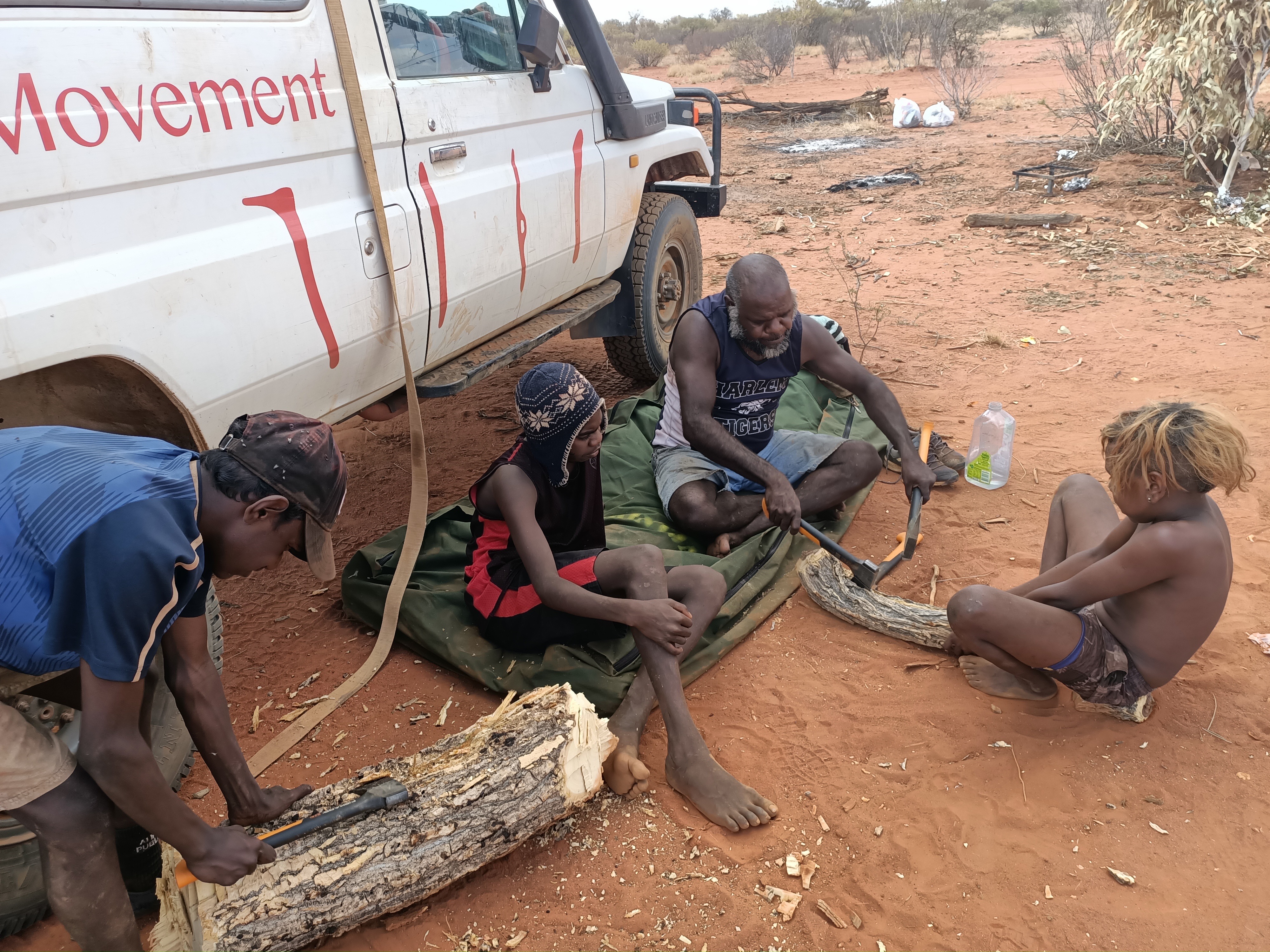
CASSE Newsletter – December 2019
December 3, 2019A large five-day meeting in Kintore in June, gathering western desert men together to discuss problems within their communities and think about new solutions and new ways forward, culminated in a big pularpa attended by women and children as well as the men.
A short story about the meeting is published in the latest edition of Community Development News. You can read the full story about the meeting below.
The Kintore community, most significantly, decided to dedicate a portion of their Community Benefit Funding to the empowering Men’s Tjilirra Movement (MTM) to facilitate a western desert men’s gathering and cultural camping on country to sit down and talk uninterrupted.
MP Scott McConnell also generously contributed to the funding. Planning for the meeting was co-ordinated by Jamie Millier Tjupurrula, Program Manager for the MTM, and Walter Jugadai, MTM team cultural consultant.
“This was one of the best days I have seen in Kintore and on community,” Tjupurrula said of the last day of the meeting. “The people were on a high and everyone was happy and proud. Overall, this was a great week and I hope to be a part of more like this.”
The location chosen for the meeting was outside of the community but close to Kintore so that it was accessible. Men from Kintore and Mt Liebig attended. Men from Papunya and Haasts Bluff were invited but were unable to attend due to other meetings and community obligations.
Planning what they wanted to discuss at the meeting, Tupurrula said: “We spoke about the lore system and how it is not teaching the lore properly and it shows when our men go to town and get in trouble with police. I spoke about us as a people, that we can come up with better ways to deal with the troubled men, young and old”.
The old men attending quickly identified that they wanted to use the meeting to provide training for songs and dances. On the second day of the meeting, some of the men gathered wood and started to work on making traditional tools – tjilirra – before they sat down to discussions.
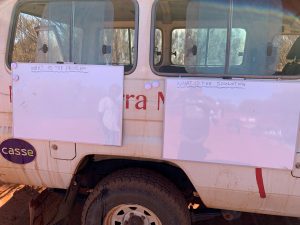
Using two white boards propped up against the familiar MTM troopie, Tjupurrula opened the discussions with one question on each whiteboard: ‘What is the problem?’ and ‘What is the solution?’. The men identified the following:
- Fighting – husband and wife. The men felt like they are not listened to, just blamed in these scenarios. They said fights start over money.
- Drugs and Alcohol. The men spoke about the problems of grog and drugs. Tjupurrula explained that most people use these this to disguise a problem or to fill a gap in your head. He explained if you don’t have the song for your dreaming maybe you are missing it and you feel bad about it, some people fill it with drugs and alcohol to make the bad feeling go away.
- Stealing. This is happening lately a lot. The men felt there are no local avenues that people can access for help.
- Kids. The men talked about kids being out at night and not going to school and not learning their culture. They spoke about the importance of schools introducing culture back into the school grounds. The Mt Liebig men spoke proudly about their school having cultural dances every Wednesday and explained that people are given some money for working with the kids and dancing. They said this makes the community happy.
- Cards. Discussing the impact of playing cards, the men spoke about how the money goes to one person but many go hungry from that game and it leads back to stealing because the kids are hungry.
- Government. The men said they don’t understand the government or what it does. They then discussed how they need to meet and develop their own plans for addressing problems that they can then present to the government (such as teaching culture in schools).
- Lore. Recognising problems with the breakdown of the lore system, the men identified some of the changes that need to happen to ensure the lore system is strengthened and taught to the young men – tool making, where their country is, their song, their dance, bush food and hunting. The men worried that these things are being replaced by phones and drugs.
- Jobs. ‘There are not many jobs, but the government says you need to be ready for one’. Tjupurrula encouraged the men to look at jobs in a different way, using culture. For example, making and selling tjilirra, demonstrating songs and dances for tourists. The men spoke about this more.
- Looking after old people. The men spoke about it being lore to care for their people so they can pass on the things the communities needed, like songs and stories, so people know who they are.
The conversations highlighted that most avenues for solving the problems lead back to the bush and culture. This, in turn, lead to the men organising and practising dances for a community pularpa to be held on the final day. The old men are now planning to hold another meeting, potentially in Mt Liebig to make it easier for the other communities to attend.
Tjupurrula wrote the following about the pularpa:
“One of the old men told me to get the boards with the points of conversation on them. The men delivered this to the women that were present. The men spoke of the trouble, that men and women need to work together to help solve the problems. There were about 25 women and the conversation was respectful. We all finished by telling the women the men want to support them by them having a meeting for the women only.
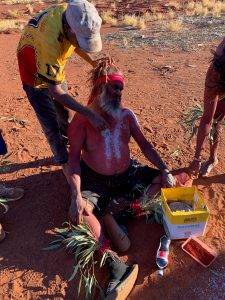
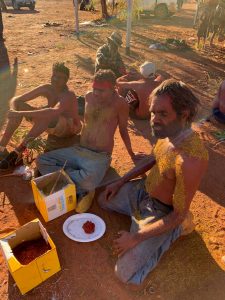
The old men said it was time to get ready for the community dance. I took ochre and wool to the women. I went back to the men and helped dress up the young boys with ochre and wool and leaves.
I started to ochre myself then young men came and helped me. One of the old men came and said: ‘you will be one of the leaders, Tjupurrula, you use the white womalu-body decoration (from grass/feathers) and the rest you use yellow womalu’.
The little boys started to gather around me as the men dressed me with the womalu. The little boys were so happy and proud. Then more men came and started to dress up. This would be the first time in a long time for men to dance, not just the boys.
The men and I stayed behind cover so we didn’t know who was outside and the people didn’t know who was in behind the cover. The women and young girls danced first and then our boys. Then the men came out there was a big crowd of people, black and white together, excited to see us. We danced and the crowd cheered at us and everyone was taking photos. Some of the small children didn’t know if we were monsters or men!”
The Men’s Tjilirra Movement (MTM) was founded Martin Jugadai, a ngangkari, who recognised country and culture is the best medicine for keeping people and communities strong.
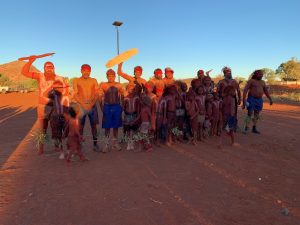
Tjilirra are traditional tools, such as kurdiji (shields), kulata (spears) and kali (boomerangs), used for hunting, ceremony and lore. As well as being tools for living, tjilirra become powerful tools for life, facilitating cultural revival and strengthening intergenerational connections.
“Making tjilirra is special, it is the spirit of our grandfather inside you,” he has said.
The heart of the MTM lies in Kintore/Walanguru (Perentie Dreaming), Mt Liebig/Amunturrngu (Willy Wagtail Dreaming), Haasts Bluff/Ikuntji (Centipede Dreaming) and Papunya/Warumpi (Honey Ant Dreaming).
The MTM is funded by the psychological organisation Creating A Safe Supportive Environment – CASSE – providing a trauma-informed framework when working on country with communities.
Pamela Nathan, a clinical and forensic psychologist who has worked in central Australia on and off for forty years is the Director of CASSE’s Aboriginal Australian Relations Program.
Talking about the amazing spirit and success of the Kintore meetings, Pamela said: “The men of the western desert came together to talk – using old tools to make new tools for living and life. They made kudiji (shields) spontaneously as protection. They talked through the days and nights, across generations, singing sacred songs and finding solutions in their Lore on their ancestral lands, then took their talks to the women. All the people came together to strengthen spirits and danced pularpa in ceremony and community and celebration”.
“The MTM helps make the process of storytelling, reflection, reclamation and reconnection possible. CASSE is deeply privileged to work together alongside with the MTM sharing such powerful transforming emotional experiences – ‘the spirit of the grandfather inside you’.”
